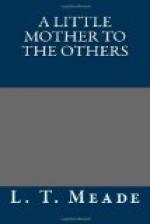“We’ll be mis’ble, but it can’t be helped,” said Diana. “I never did like aunts, and I’m never going to, what’s more. Come ’long now, sildrens. It’s a gweat nuisance getting up so early, particular when father can’t help hisself. Can you, father? Go to s’eep now, father. Come ’long this minute, back to bed, sildrens.”
Diana looked really worthy of her distinguished name as she strode down the passage and returned to the night-nursery. She and Orion slipped into their respective little cots and lay down without waking either Fortune or Susan, who slept in beds at the opposite side of the room. Iris and Apollo also returned to their beds, and presently Apollo dropped asleep, for, though he had an alarming temper, his fits of passion never lasted long. But Iris did not close her bright brown eyes again that morning. She lay awake, full of troubled thoughts—thoughts far too old for her tender years.
It was one of Fortune’s fads never on any occasion to awaken a sleeping child, and as the other children slept rather longer than usual after their early waking, breakfast was in consequence full half an hour late in the day-nursery that morning. At last, however, it was finished. No special lessons had been attended to since mother had gone away to the angels, and the children, snatching up their hats, rushed off as fast as possible to the garden. When they got there they all four breathed freely. This at least was their own domain—their fairyland, their country of adventure. From here they could travel to goodness only knew where—sometimes to the stars with bright Apollo and brave Orion—sometimes to happy hunting fields with Diana, the goddess of the chase, and sometimes they might even visit the rainbow, with sweet Iris as their companion.
There never were happier children than these four in that lovely, lovely beyond words, garden. When the children went into it, it seemed as if an additional ray of sunshine had come out to fill all the happy world with light and love and beauty. The bees hummed more industriously than ever, the flowers opened their sweet eyes and gazed at the children, the animals came round them in a group.
On this special morning, however, Diana’s dear little face looked very grave and full of business.
“It’s most ’citing,” she said. “’Fore we does anything else we must ’tend to the funerals—there is such a lot of dead ’uns to bury this morning. Come ’long to the dead-house at once, Iris.”
“I must smell the Scotch roses first,” answered Iris.
“You can do that afterwards, can’t you? There’s poor Rub-a-Dub. We has to ’cide whether he is to have a public or a pwivate funeral, or whether he is just to be sewn up in dock leaves, and put into the gwound p’omisc’s.”
Diana had a great facility for taking up long words, which she always used in the most matter-of-fact style, not in the least caring how she pronounced them.




